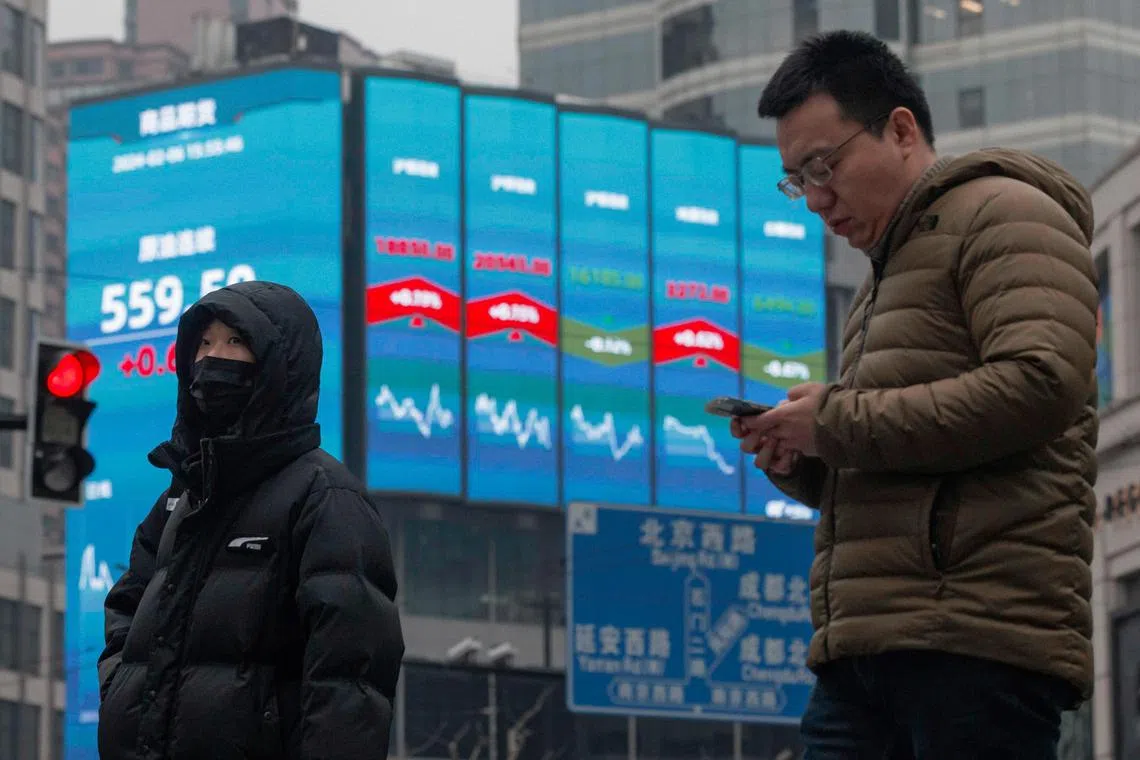China stock rally continues after Beijing replaces top markets regulator
Sign up now: Get ST's newsletters delivered to your inbox

Chinese authorities had struggled to halt a sell-off in the stock market, with piecemeal support measures over the past few months.
PHOTO: EPA-EFE
Follow topic:
SHANGHAI – A rally in Chinese shares extended to Feb 8 after the authorities signalled a stronger resolve to stem a US$7 trillion (S$9.4 trillion) rout via a surprise move to replace the head of the country’s securities regulator.
The blue-chip CSI 300 Index closed up 0.6 per cent to log a fourth straight session of rebound after Beijing announced that Mr Wu Qing, a banking and regulation veteran, will replace Mr Yi Huiman as chairman of the China Securities Regulatory Commission (CSRC). The Shanghai Composite Index climbed 1.3 per cent, with both indexes booking their biggest weekly gain since November 2022.
Hong Kong’s Hang Seng Index, however, lost 1.3 per cent, dragged by a 6.1 per cent drop in Alibaba Group Holding, after the internet giant missed analysts’ estimates for third-quarter revenue.
The abrupt appointment of Mr Wu, who earned the reputation as “the broker butcher” when he led a crackdown on traders in the mid-2000s, cemented the impression that the authorities are increasingly concerned about the economic and social damage of a struggling stock market.
The move added to a drumbeat of rescue measures, from wider trading curbs to a show of support by the nation’s sovereign wealth fund, that triggered a rebound earlier this week.
The optimism persisted even as data showed that China’s consumer prices fell in January at the fastest pace since the global financial crisis
“This appointment ends the practice that commercial bankers head the CSRC, as Wu Qing is a veteran securities regulator with experience across regulator and exchanges,” Ms Shujin Chen, an analyst at Jefferies Financial Group, wrote in a note. “But more importantly, this unusual move signals more attention to capital market from President Xi (Jinping).”
The removal of Mr Yi, who has been in charge of the CSRC since 2019, echoes a move to shift the market chief in 2016 after an earlier epic sell-off in stocks. The dismissal of the 59-year-old was a surprise, as officials of his rank typically retire at 65.
China’s previous decisions to name new markets chiefs have proved a success in boosting shares. The CSI 300 rose more than 40 per cent in almost a two-year span after Mr Liu Shiyu was assigned to replace Mr Xiao Gang in February 2016. The gauge rose more than 80 per cent over two years after Mr Liu was replaced by Mr Yi five years ago.
Pressure is mounting on Beijing to act more quickly and resolutely to end a market meltdown, which had wiped out US$7 trillion from Hong Kong and mainland equities since their 2021 peaks, that poses a growing threat to financial and social stability. It is also crucial for policymakers to prevent a weak stock market from further damping consumer demand as China enters the Chinese New Year holiday week.
The rescue measures rolled out so far have mostly been piecemeal in nature, including wider trading restrictions on investors like quantitative hedge funds, as well as moves such as guiding brokerages to adjust margin call levels. Earlier efforts included curbs on short-selling, as well as state buying of shares in the nation’s largest banks.
Mr Wu is no stranger to markets. He earlier headed the Shanghai Stock Exchange for almost two years. He held various roles at the CSRC, earning the “broker butcher” nickname after shuttering 31 firms over regulation breaches. He then oversaw the fund industry until 2010.
Mr Xi has made prevention of major financial risks a top priority while officials strive to boost the post-Covid-19 economy, Mr Wu’s hardline approach and zero tolerance for wrongdoing might put him in the right spot to help achieve that goal.
“The new CSRC head will come in with a mission to revive the markets, which is positive,” said Union Bancaire Privee’s managing director Ling Vey-sern. “Having said that, he is not in a position to resolve structural and economic issues. Investors need to see improvements on those fronts to regain confidence.” BLOOMBERG

